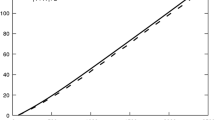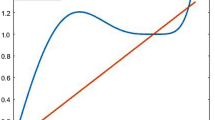Abstract
Generalized GIPSCAL, like DEDICOM, is a model for the analysis of square asymmetric tables. It is a special case of DEDICOM, but unlike DEDICOM, it ensures the nonnegative definiteness (nnd) of the model matrix, thereby allowing a spatial representation of the asymmetric relationships among “objects”. A fast convergent algorithm was developed for GIPSCAL with acceleration by the minimal polynomial extrapolation. The proposed algorithm was compared with Trendafilov’s algorithm in computational speed. The basic algorithm has been adapted to various extensions of GIPSCAL, including off-diagonal DEDICOM/GIPSCAL, and three-way GIPSCAL.
Similar content being viewed by others
References
Chino N (1990) A generailzed inner product model for the analysis of asymmetry. Behaviormetrika 27: 25–46
Constantine GA, Gower JC (1978) A graphical representations of asymmetric matrices. Appl Stat 27: 297–304
Harshman RA (1978) Models for analysis of asymmetrical relationships among N objects or stimuli. In: Paper presented at the first joint meeting of the Psychometric Society and the Society of Mathematical Psychology, Hamilton, Ontario
Harshman RA, Green PE, Wind Y, Lundy ME (1981) A model for the analysis of asymmetric data in marketing research. Market Sci 1: 205–242
Jennrich RI (2001) A simple general procedure for orthogonal rotation. Psychometrika 66: 289–306
Kiers HAL, Takane Y (1994) A generalization of GIPSCAL for the analysis of nonsymmetric data. J Classif 11: 79–99
Loisel S, Takane M (2009) Fast indirect robust generalized method of moments. Comput Stat Data Anal 53: 3571–3579
Loisel S, Takane Y (2010) Minimal polynomial extrapolation in MATLAB and in R. (submitted)
Smith DA, Ford WF, Sidi A (1987) Extrapolation methods for vector sequences. SIAM Rev 29: 199–233
Takane Y (1985) Diagonal estimation in DEDICOM. In: Proceedings of the 13th annual meeting of the Behaviormetric Society. Behaviormetric Society of Japan, Tokyo, pp 100–101
Takane Y, Zhang Z (2009) Algorithms for DEDICOM: acceleration, deceleration, or neither?. J Chemometr 23: 364–370
Takane Y, Jung K, Hwang H (2010) An acceleration method for ten Berge et al.’s algorithm for orthogonal INDSCAL. Contr Stat 25: 409–428
ten Berge JMF, Kiers HAL (1989) Fitting the off-diagonal DEDICOM model in the least squares sense by a generalization of the Harman and Jones Minres procedure to factor analysis. Psychometrika 54: 333–337
Trendafilov N (2002) GIPSCAL revisited: a projected gradient approach. Stat Comput 12: 135–145
Author information
Authors and Affiliations
Corresponding author
Additional information
The work reported here has been supported by a grant 10630 from the Natural Sciences and Engineering Research Council of Canada.
Rights and permissions
About this article
Cite this article
Loisel, S., Takane, Y. Generalized GIPSCAL re-revisited: a fast convergent algorithm with acceleration by the minimal polynomial extrapolation. Adv Data Anal Classif 5, 57–75 (2011). https://doi.org/10.1007/s11634-010-0083-2
Received:
Revised:
Accepted:
Published:
Issue Date:
DOI: https://doi.org/10.1007/s11634-010-0083-2
Keywords
- Asymmetric square tables
- DEDICOM
- Singular value decomposition (SVD)
- Dynamical system algorithm
- Diagonal estimation
- Three-way data




